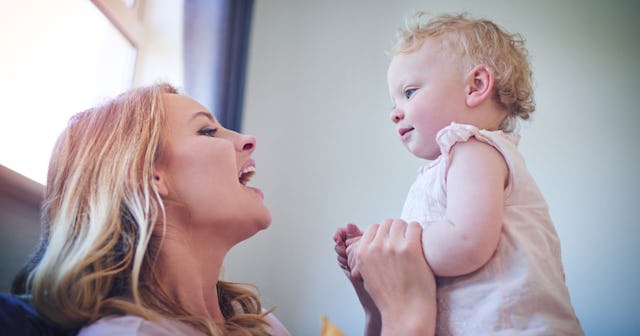Baby Talk Actually Helps Kids Learn To Speak, So Keep It Up

A new study has found that baby talk and babbling helps infants learn to speak themselves
There’s long been a misconception that baby talk is bad for a child’s development — that sing-songy speech, babbling, monosyllables, and nonsense words don’t teach kids the correct way to speak as an adult.
But new research suggests that our parental instincts to use baby talk when addressing an infant are most probably right. Why? Because baby talk helps introduce kids to the world of speech in a way that they can mimic.
The study, which took place at the University of Florida and which was published this month in the Journal of Speech, Language, and Hearing Research, gave six- to eight-month-old babies two voices to listen to: One that mimicked the sound of adult voices and one that mimicked the sounds of baby voice, one with smaller and shorter sounds. The babies greatly preferred hearing the baby talk over the adult talk — in fact, researchers found that the kiddos “displayed a robust and distinct preference for speech with resonances specifying a vocal tract that is similar in size and length to their own.”
Scientists believe that babies are drawn to baby talk (which they call infant-directed speech) because they are hearing how their first words should sound when they’ll come out of their own mouths.
Younger babies, ages four to six months old, didn’t show a preference to noises either way — researchers believe it’s because they are not yet thinking about how to make word-like sounds.
“It seems to stimulate motor production of speech, not just the perception of speech,” coauthor Dr. Matthew Masapollo explains to Science Daily. “It’s not just goo-goo ga-ga.”
In other words, baby talk lets babies learn how to talk, on their beginner’s level. It makes speech accessible to them. It meets them where they are.
“We’re trying to engage with the infant to show them something about speech production,” coauthor Dr. Linda Polka said. “We’re priming them to process their own voice.”
Of course, past research has suggested that baby talk is a good thing. Last year, a large Stanford University study of thousands of babies in 16 countries found that babies the world over prefer baby talk to adult talk — it’s better to engage them and therefore better to teach them language.
There’s still a lot more to know — like when in a child’s development baby talk stops being educational and starts being obnoxious and even detrimental (like, by the time they are 15, we’re guessing we shouldn’t be shrilly asking our kids Where did dat go??). For now, though, starting at around six months, and until they have a better handle on how to make basic sounds and words, it seems like baby talk can only help.